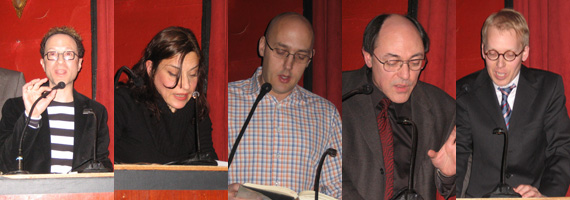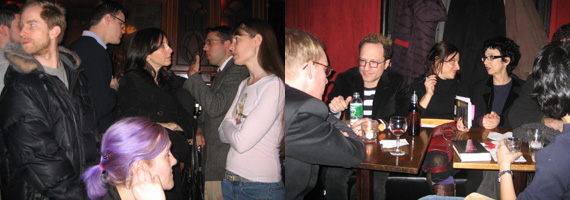2.18.07: Thomas Bernhard Night

2.18.07: KGB hosted a tribute to Austrian novelist, playwright and poet Thomas Bernhard (1931-89). A group of New York authors who have been influenced by their encounters with his work read and discussed selections from Bernhard's works. Bernhard is not as widely read in the U.S. as he is in Europe. But with his unique style, in which monologues reach a comic feverish pitch through relentless exaggeration, repetition and contradiction, his influence among innovative writers is outsized.
The following writers read a selection from Bernhard vast and varied body of work:
Wayne Koestenbaum has published five books of poetry, most recently Best-Selling Jewish Porn Films. His next book, Hotel Theory, will be published in spring 2007. He is a Distinguished Professor of English at the CUNY Graduate Center, and currently also a Visiting Professor in the painting department of the Yale School of Art.
Rhonda Lieberman, the only woman on the panel, is a New York-based writer, a Contributing Editor of Artforum, a Visiting Critic at the Yale School of Art, and a longtime admirer of Bernhard's super-crabby oeuvre.
Ben Marcus is the author of The Age of Wire and String and Notable American Women. He has published fiction and essays in Harper's, The Paris Review, Tin House, McSweeney's, and Conjunctions.
Geoffrey O'Brien is the author of Sonata for Jukebox, The Browser's Ecstasy, and other books. Dale Peck is a novelist and critic. His new novel, The Garden of Lost and Found, will be published this fall. His favorite Bernhard novels are Old Masters, Concrete, and Woodcutters, although not always in that order.
Matthew Reuchbauer, the Deputy Directory, Austrian Cultural Forum, NYC, made a guest appearance. He surprised and thrilled the audience by reading Bernhard auf Deutsch.  In the Bar...After the reading, KGB grabbed three of the panelists and got them to speak about their connections to Bernhard.
In the Bar...After the reading, KGB grabbed three of the panelists and got them to speak about their connections to Bernhard.
Ben Marcus:
I was in my early twenties when I discovered Bernhard - I was in grad school - I think I read Woodcutters first. I was held in total suspense by this monologue. I loved the fury, the passion and the vulnerability of the voice, and the way Bernhard could sustain these opposites. It seemed like such a paradox to me. And it was done in such meticulous, precise language, like the whole book was a machine. I think I was resisting books that seemed more decadent and indulgent, but there was no word out of place and that really, really appealed to me.
I don't know if I'm allowed to claim a direct connection in my own writing style, but I do know that it was so important and necessary for me to see how moral he could be and yet so entertaining. How he could get his book to a place where it was really about the most important things. It didn't seem like a big, pretentious, philosophical idea book. I was always worried about getting work to a place where it had real vitality and wasn't just showing that it was a passable short story in the manner of facts, but that you could actually create a work that deals with the problem of being a person in the world. And he does it with a humor and relentlessness.
Wayne Koestenbaum:
The first novel I read of Bernhard was called The Loser and it's about a failed musician. I loved how it used failure as the grounds for writing, for production. I was a failed pianist myself, and a failed writer, and I've always tried to turn failure into success. I thought it was an exemplary text for using that trick for creative exploration.
I also just love his rants. I love the rhythms of his prose. I should put on the record that I think that he's kind of gay. That didn't get mentioned a lot, but…he is kind of gay.
I only discovered Bernhard four or five years ago. I really wish I had read him earlier because he would have helped me make some discoveries more quickly - realizing that going as far as possible in your obsessions can be funny… just the notion that you can turn yourself, at your most honest and autobiographical, into a character.
Matthew Reuchbauer - Deputy Director, Austrian Cultural Forum NYC
In Austria, Benhard is now considered one of the most important writers of the 20th century and even the most important of the Austrian post-war modern movement.
On a personal level, I love Thomas Bernhard. When I was growing up in the 1980's, Bernhard was very famous and he was very controversial, There were chances to see him in person - he was producing one play after the other. I went to all his plays and read all his books.
I think he is a special voice in German language literature. As an Austrian writer, I think he tells me something about my own country. What's fascinating for me to see here, in a New York context, is that he's a universal writer as well. He still makes audiences laugh, he makes them wonder, and he's in an entirely different context.